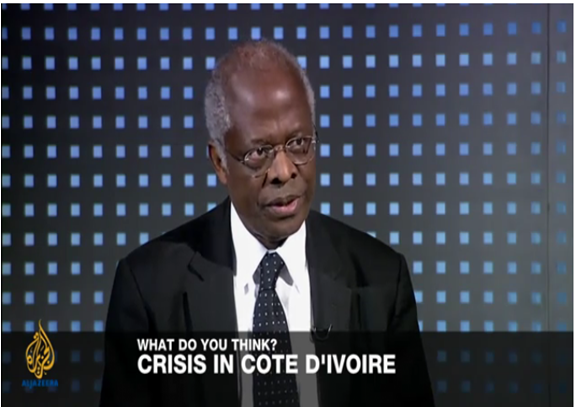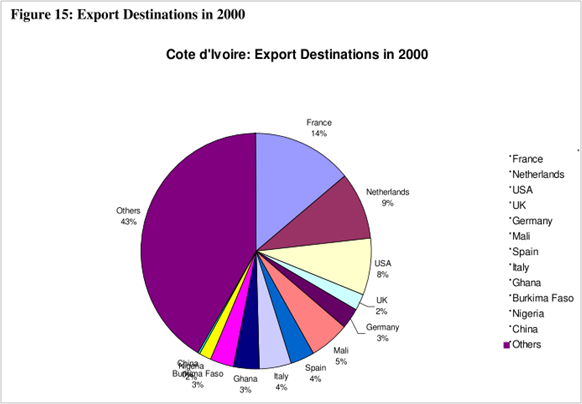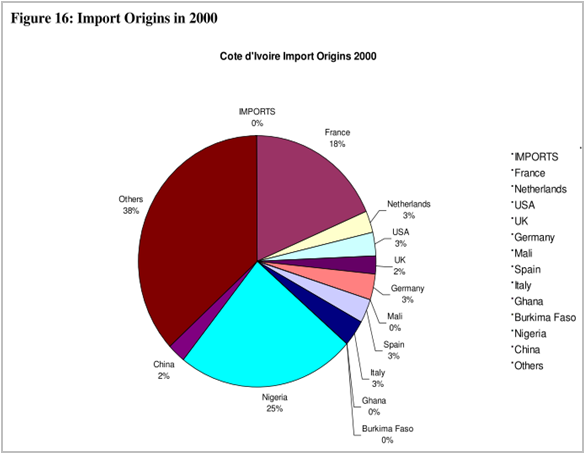2011-03-19 Cables debunk Gbagbo’s ‘French Conspiracy against Ivory Coast’

Douoguih: The real reason we’re watching a tragedy in Ivory Coast is that president Gbagbo is a democrat; he is a modern Mandela. He spent 30 years in the opposition. He is not a violent man. He doesn’t have a bank account outside the Ivory Coast. He doesn’t own property anywhere. But his vision is that it is the true emancipation of Ivory Coast. France is afraid of that, because all the former colonies would follow his example, and France would be a big loser. That is what’s at stake in Ivory Coast right now.
Kahn: Let me ask you why they(U.S, UN and France) want Ouattara to be the president?
Douoguih: Here is the reason. Ivory Coast is very rich. And as I told you earlier, president Gbagbo’s vision of running Ivory Coast involves total emancipation. Freedom to deal with all commerce. France does not accept that.”
And leaked cables suggest that the core of the alleged conspiracy is completely groundless in current post-Chirac African policies of France.
The French Conspiracy of Gbagbo government:
“France vetoes Gbagbo government to dominate economy and politics of Ivory Coast”
One of the main reasons for Laurent Gbagbo, an incumbent president of Ivory Coast, to condone the violent attacks committed by youth groups(mainly COJEP, led by Ble Goude for a long time) against French peacekeeping personnel was that France has been politically attacking Gbagbo-ruling Ivory Coast. He strongly insisted that France is trying to regain control of West Africa by cracking down the presidential election of a sovereign nation, which takes 40% of the economic wealth in the region and has a permanent French military base. This has been enormously persuasive to Ivorians, the idea that current international peacekeeping aids are in fact sabotage from France with an election as a ‘pretext’.
Why ‘French Conspiracy’ is so influential
The reason for the ‘French Conspiracy’ being extremely persuasive to Ivorians resides in three decades of dictatorship that Ivory Coast had undergone until the early 1990s, especially with regard to its role in the 'France-Afrique' diplomacy paradigm.
Before France pursued shifts in policies toward its former colonies declaring an end to ‘Chirac-style personal diplomacy’ in Africa in 2007( Source: 07PARIS921), Félix Houphouët-Boigny, a dictator of Ivory Coast who died in 1993, enjoyed decades of support from France beginning in the 1960s. He rose to be a prime partner of France in the region whose works had been a major driving force of founding the notion of ‘France-Afrique’ diplomacy. And together with other leaders in the region, he gained a private fortune through the special relationship.
Gbagbo had been popular as a high-profile opposition party leader who had launched FDI (Ivorian Popular Front) in the early 1980s. However, he had been a controversial figure since the 2005 crisis in Ivory Coast caused by unrest over the presidential election. He has been blamed for aggravating discrimination against the northern part, where a large majority of the population had entered Ivory Coast as a cheap labor force, exploited by the Houphouët-Boigny government in the economic boom that hit Ivory Coast during 1960-1970s. After the November 2010 presidential election, Gbagbo refused to step down after invalidating massive amount of votes from the northern region, where his political rival Alassane Ouattara is popular. He labeled the recognition from the UN, AU, ECOWAS and others that Ouattara is the final winner as a 'fraud' and mostly, a conspiracy led by France.
France’s struggle to stand back from domestic politics of Ivory Coast
Leaked U.S. embassy cables on the attitude of France to the crisis in Ivory Coast, however, reveal completely different facts – France regards its participation in Ivory Coast as a quagmire and wishes to get out of it as soon as possible, it is far from wishing to 'lead a conspiracy'.
Cables show that the major reasons France wants to stand back is that it has suffered from the huge cost it has paid in military bases in the ‘France-Afrique’, the region of former French colonies. The shift has begun since the end of the term of president Jacques Chiraque, as cable 07PARIS921 indicates, that policies on Africa will be changed to be more ‘business-like’ rather than the ‘France-Afrique’ model. 08PARIS1501 especially points out the ‘Operation Lincorne’, current French peacekeeping mission in Ivory Coast, as ‘perhaps France's last unilateral military intervention in the old style’. According to the cable, France is quite ‘bitter’ due to the fact that the operation consumes ‘250 million euro per year, or well over a billion euro in total’. France even welcomes the entering of U.S. and China in Africa with expectations of ‘sharing the burden’.
08PARIS1698 also shows concrete plans of consolidation of French military base in Africa. But there’s no mention of Ivory Coast as a possible stronghold to ‘regain control of West Africa’ as insisted by Gbagbo and Douoguih.
"They foresee their military presence coalescing into two hubs, one on the Atlantic Ocean (Senegal or Gabon) and one on the Indian Ocean(Djibouti or French overseas department Reunion Island). Even these bases may eventually disappear if Africans prove capable of maintaining peace and security."
This attitude towards Ivory Coast appears again in the implementation of a ‘new command structure in Africa featuring four geographic commands’ in 2006, where “Notably, Cote d’Ivoire was dropped from this scheme.”
In the cable, France states its wish to reform the current bilateral defense agreements with eight major countries in Africa – including Ivory Coast – to sub-regional groupings, like ECOWAS(Economic Community of West African States). Based on the talk between Ivory Coast Presidential Advisor Romain Serman and Ambassador Mary Yates (AFRICOM) in June, the cable predicts that “If elections occur successfully in Cote d'Ivoire in 2008 and UNOCI and Operation Licorne then disband, we expect that France's military presence will shrink quickly, with a possible French decision to end basing altogether in Cote d'Ivoire.”
Gbagbo fights for ‘total emancipation in national economy from France’?
Besides the renowned French Conspiracy, the idea is presented by Douoguih that president Gbagbo plans to achieve ‘total emancipation from France’ in terms of Ivory Coast economy; “Freedom to deal with all commerce.” However, according to a document published by the World Bank, Ivory Coast started the ‘trade liberalization’ in 1994, long before Gbagbo was sworn in as a president. And another document, also from World Bank states that the economy of Ivory Coast has been far from ‘dominated by France’.

